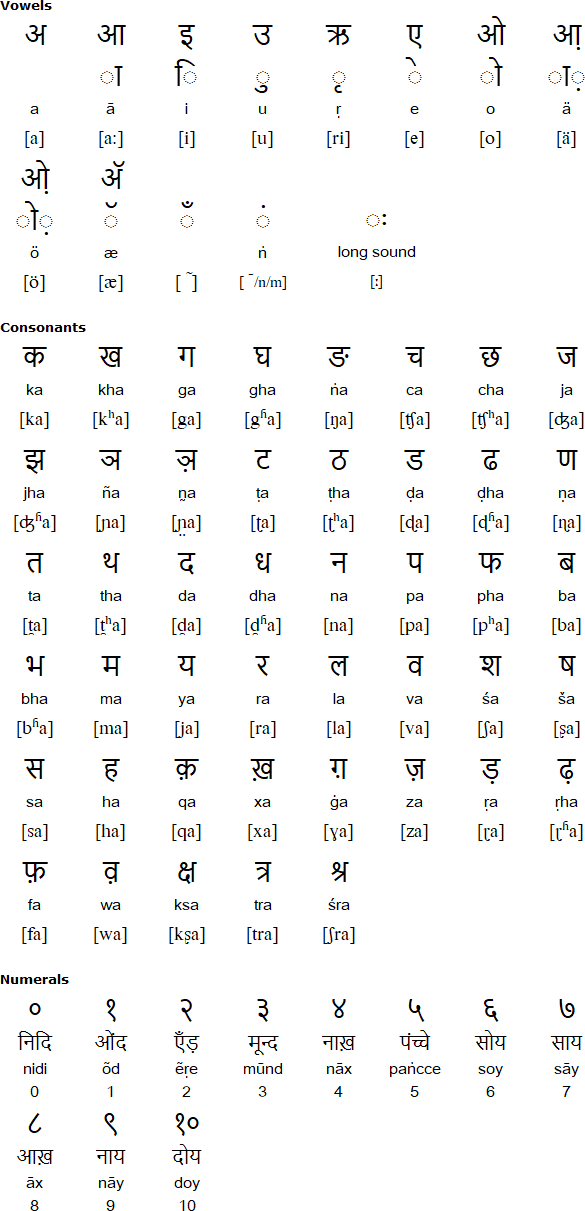Kurukh is a Northern Dravidian language spoken by about 2 million people, mainly in northern India, and also in northern Bangladesh, eastern Nepal and in southern Bhutan. The majority of Kurukh speakers are part of the Oraon tribe. Members of the Kisan tribe also speak it. Each tribe has its own dialect, which are known as Oraon and Kisan. The language is also known as Kurux, Kadukali, Kurka, Kurukh, Urang, Uraon or Oraoan.
In India there are about 1.9 million speakers of Kurukh, particuarly in Raigarh and Surguja districts of Chhattisgarh state, in Ranchi district of Jharkhand state, in Jharsuguda and Sundargarh districts of Odisha state, and in Jalpaigiri district of West Bengal state. It is also spoken in Assam, Bihar, and Tripura states.
Kurukh is used in literature, in newspapers and on the radio. It is an official language in Jharkhand and West Bengal, and used in schools in Jharkhand and Chhattisgarh.
In Bangladesh there were about 50,000 speakers of Kurukh in 2011, particularly in Dinajpur, Panchagarn, Rangpur, Saidpur and Thakurgaon districts of Rangpur division.
In Nepal Kurukh is spoken by about 33,700 people in the Bara, Jhapa, Morang, Parsa, Siraha, and Sunsari districts of the Kosi zone. The ancestors of the Kurukh speakers in Nepal moved there in the mid-19th century to work in the indigo fields.
There are about 4,200 speakers of Kurukh in southern Bhutan, particularly in Chhukha and Samtse districts.
Kurukh is usually written with the Devanagari alphabet. An alternative script, known as Tolong Siki, was invented in 1999 by a doctor called Narayan Oraon. It was officially recognised in Jharkhand state in 2007, and a number of books and magazines have been published in it. Another alphabet for Kurukh, known as Kurukh Banna, was created by Basudev Ram Khalkho

Download an alphabet chart for Kurukh (Excel)
होरमा आलारिन हक गहि बारे नू मल्लीन्ता अज़ादी अरा आण्टेम मन्ना गही हक़ ख़खरकी रई। आरिन लूर अरा जिया गही दव बउसा ख़खकी रई अरा तम्हैं मझी नू मेल-प्रेम गही बेवहार ननना चही।
Hormā ālārin hak gahi bāre nū mallintā azādi arā aṅṭem mannā gahi haq xakharki raī. Ārin lur arā jiyā gahi dav bausā xakhakī raī arā tumhēṅ majhī nū mel-prem gahi bevhār nannā cahī.
All human beings are born free and equal in dignity and rights. They are endowed with reason and conscience and should act towards one another in a spirit of brotherhood.
(Article 1 of the Universal Declaration of Human Rights)
Details supplied by Biswajit Mandal (biswajitmandal[dot]bm90[at]gmail[dot]com)
Information about Kurukh
http://en.wikipedia.org/wiki/Kurux_language
https://www.ethnologue.com/language/kru
Badaga, Brahui, Dhundari, Gondi, Irula, Jatapu, Kannada, Kodava, Kolam, Konda, Koya, Kurukh, Malayalam, Malto, Mukha Dora, Ravula, Sankethi, Savara, Sunuwar, Suriyani Malayalam, Tamil, Telugu, Toda, Tulu, Yerukula
Aka-Jeru, Angika, Athpare, Avestan, Awadhi, Bahing, Balti, Bantawa, Belhare, Bhili, Bhumij, Bilaspuri, Bodo, Bhojpuri, Braj, Car, Chamling, Chhantyal, Chhattisgarhi, Chambeali, Danwar, Dhatki, Dhimal, Dhundari, Digaro Mishmi, Dogri, Doteli, Gaddi, Garhwali, Gondi, Gurung, Halbi, Haryanvi, Hill Miri, Hindi, Ho, Jarawa, Jaunsari, Jirel, Jumli, Kagate, Kannauji, Kham, Kangri, Kashmiri, Khaling, Khandeshi, Kharia, Khortha, Korku, Konkani, Kullui, Kumaoni, Kurmali, Kurukh, Kusunda, Lambadi, Limbu, Lhomi, Lhowa, Magahi, Magar, Mahasu Pahari, Maithili, Maldivian, Malto, Mandeali, Marathi, Marwari, Mewari, Mundari, Nancowry. Newar, Nepali, Nimadi, Nishi, Onge, Pahari, Pali, Pangwali, Rajasthani, Rajbanshi, Rangpuri, Sadri, Sanskrit, Santali, Saraiki, Sirmauri, Sherpa, Shina, Sindhi, Sunwar, Sylheti, Tamang, Thakali, Thangmi, Wambule, Wancho, Yakkha, Yolmo
Page last modified: 14.04.22
[top]
You can support this site by Buying Me A Coffee, and if you like what you see on this page, you can use the buttons below to share it with people you know.

If you like this site and find it useful, you can support it by making a donation via PayPal or Patreon, or by contributing in other ways. Omniglot is how I make my living.
Note: all links on this site to Amazon.com, Amazon.co.uk
and Amazon.fr
are affiliate links. This means I earn a commission if you click on any of them and buy something. So by clicking on these links you can help to support this site.
[top]